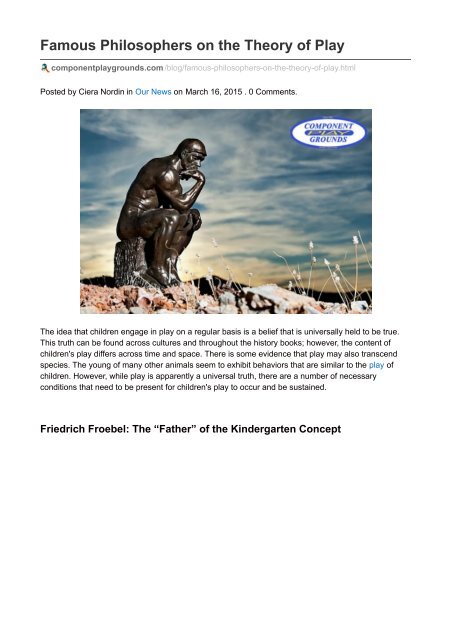Famous Philosophers on the Theory of Play
The idea that children engage in play on a regular basis is a belief that is universally held to be true. This truth can be found across cultures and throughout the history books; however, the content of children's play differs across time and space.
The idea that children engage in play on a regular basis is a belief that is universally held to be true. This truth can be found across cultures and throughout the history books; however, the content of children's play differs across time and space.
You also want an ePaper? Increase the reach of your titles
YUMPU automatically turns print PDFs into web optimized ePapers that Google loves.
<str<strong>on</strong>g>Famous</str<strong>on</strong>g> <str<strong>on</strong>g>Philosophers</str<strong>on</strong>g> <strong>on</strong> <strong>the</strong> <strong>Theory</strong> <strong>of</strong> <strong>Play</strong><br />
comp<strong>on</strong>entplaygrounds.com /blog/famous-philosophers-<strong>on</strong>-<strong>the</strong>-<strong>the</strong>ory-<strong>of</strong>-play.html<br />
Posted by Ciera Nordin in Our News <strong>on</strong> March 16, 2015 . 0 Comments.<br />
The idea that children engage in play <strong>on</strong> a regular basis is a belief that is universally held to be true.<br />
This truth can be found across cultures and throughout <strong>the</strong> history books; however, <strong>the</strong> c<strong>on</strong>tent <strong>of</strong><br />
children's play differs across time and space. There is some evidence that play may also transcend<br />
species. The young <strong>of</strong> many o<strong>the</strong>r animals seem to exhibit behaviors that are similar to <strong>the</strong> play <strong>of</strong><br />
children. However, while play is apparently a universal truth, <strong>the</strong>re are a number <strong>of</strong> necessary<br />
c<strong>on</strong>diti<strong>on</strong>s that need to be present for children's play to occur and be sustained.<br />
Friedrich Froebel: The “Fa<strong>the</strong>r” <strong>of</strong> <strong>the</strong> Kindergarten C<strong>on</strong>cept
Friedrich Froebel believed that <strong>the</strong> purpose <strong>of</strong><br />
educati<strong>on</strong> was to encourage and guide man. In his<br />
philosophies, he proposed that man was a<br />
c<strong>on</strong>scious, thinking, and perceiving being. From a<br />
child to an adult, educati<strong>on</strong> must show him <strong>the</strong><br />
ways and meanings <strong>of</strong> attaining a goal. To this<br />
end, educati<strong>on</strong> must have aspects <strong>of</strong> pers<strong>on</strong>al<br />
choice. In children, pers<strong>on</strong>al choice can be<br />
expressed through play. They must have <strong>the</strong><br />
choice to choose what type <strong>of</strong> play, or educati<strong>on</strong>,<br />
<strong>the</strong>y will engage in. These choices will result in<br />
<strong>the</strong>ir attainment <strong>of</strong> specific, pers<strong>on</strong>al goals.<br />
Plato: The Laws and <strong>the</strong> Republic Justify <strong>the</strong> Use <strong>of</strong> <strong>Play</strong> in Educati<strong>on</strong><br />
Plato's philosophies show us that <strong>the</strong> educati<strong>on</strong><br />
should be tailored to <strong>the</strong> public needs. He points<br />
out that educati<strong>on</strong> is not to point out who will rule,<br />
but who will follow in patriotism. To this end, he<br />
argues that boys and girls should receive <strong>the</strong> same<br />
teaching. In order for <strong>the</strong> children to be receptive to<br />
eructati<strong>on</strong>, Plato believes that <strong>the</strong> educati<strong>on</strong>al<br />
process should begin as early as possible. He<br />
suggests that 3 to 6 year olds should play different<br />
games. Older children should play <strong>the</strong> same<br />
games with <strong>the</strong> same rules. By playing <strong>the</strong> same<br />
games, children can learn to follow <strong>the</strong> rules and<br />
become accustomed to being ruled by good<br />
principles. The need for rules in play, similar play,<br />
and play in educati<strong>on</strong> will create a sustainable<br />
society.<br />
Lev Vygotsky: Introducti<strong>on</strong> <strong>of</strong> Abstract <strong>Play</strong>
Lev Vygotsky's philosophies show us that children<br />
can develop abstract meaning separate from <strong>the</strong><br />
objects in <strong>the</strong> world. In o<strong>the</strong>r words, imaginary play<br />
can help <strong>the</strong> child to develop new ways <strong>of</strong> thinking.<br />
Vygotsky goes <strong>on</strong> to say that imaginati<strong>on</strong> is a new<br />
formati<strong>on</strong>, it is not something found in animals.<br />
Through play and acti<strong>on</strong>s a child's imaginati<strong>on</strong> can<br />
grow. This is not something that can be found in a<br />
young child. It, imaginati<strong>on</strong>, must be nurtured and<br />
grown throughout <strong>the</strong> course <strong>of</strong> a child's life.<br />
Through <strong>the</strong>ir imaginati<strong>on</strong> <strong>the</strong>y can play and learn<br />
more about realistic or unrealistic desires.<br />
John Locke: Learning Should Be Achieved Through <strong>Play</strong><br />
Philosopher John Locke believed that children<br />
would develop a desire to be taught, if and <strong>on</strong>ly if,<br />
<strong>the</strong>ir learning was made into a recreati<strong>on</strong>. Locke<br />
thought that children should not have work or<br />
anything serious laid <strong>on</strong>to <strong>the</strong>m. He believed that<br />
<strong>the</strong> idea <strong>of</strong> "work" would injure a child's health. In<br />
o<strong>the</strong>r words, children should be allowed to learn<br />
through play, not by being forced to read <strong>the</strong>ir<br />
books. Through play and choice, children could<br />
instead learn to love <strong>the</strong>ir books, ra<strong>the</strong>r than hate<br />
<strong>the</strong>m.<br />
Erik Eriks<strong>on</strong>: <strong>Play</strong> is Necessary to<br />
Social Development
Erik Eriks<strong>on</strong> had similar <strong>the</strong>ories to play <strong>the</strong>ory is<br />
similar to Lev Vygotsky. He believed that play was<br />
a necessary factor in a child's social development.<br />
The play <strong>of</strong> children is not merely an expressi<strong>on</strong> <strong>of</strong><br />
<strong>the</strong>ir c<strong>on</strong>flicts and problems, ra<strong>the</strong>r, it is an attempt<br />
to find symbolic soluti<strong>on</strong>s. Much like Vygotsky<br />
believed that <strong>the</strong> imaginati<strong>on</strong> led to abstract<br />
thinking and improved reas<strong>on</strong>ing, Eriks<strong>on</strong> thought<br />
that play was crucial to a child's social<br />
development. Through play <strong>the</strong> child could learn to<br />
resolve problems, not by c<strong>on</strong>crete soluti<strong>on</strong>s, but<br />
through abstract thinking that could lead to internal<br />
soluti<strong>on</strong>s.<br />
John Dewey: <strong>Play</strong> is Akin to Survival<br />
John Dewey felt that <strong>the</strong> youngest children would<br />
have been given objects to play with that would<br />
have been necessary for survival. By playing with<br />
<strong>the</strong>se objects, children could learn to be an active<br />
part <strong>of</strong> <strong>the</strong> community, while also enhancing <strong>the</strong>ir<br />
odds <strong>of</strong> survival. For example, during <strong>the</strong> St<strong>on</strong>e<br />
Age children would have been given a stick to<br />
throw and play with. The stick would have<br />
represented <strong>the</strong> future spear that <strong>the</strong> child would<br />
need to wield in order to survive. Once again we<br />
see that play is necessary for a child's<br />
development <strong>of</strong> certain skills.<br />
Melanie Klein: The Study <strong>of</strong> Child<br />
Analysis
Melanie Klein developed a technique <strong>of</strong> child<br />
analysis that is still used today. Her “play<br />
technique” suggests that a child's play should be<br />
viewed as symbolic representati<strong>on</strong>s <strong>of</strong> <strong>the</strong>ir<br />
unc<strong>on</strong>scious thoughts and emoti<strong>on</strong>s. In this vein, a<br />
child's play activities should be interpreted in <strong>the</strong><br />
same way that dreams and free associati<strong>on</strong>s are in<br />
adult analysis. Through Klein's philosophies we<br />
now view a child's play as a meaningful activity<br />
that can and should be analyzed.<br />
Jerome Bruner<br />
Jerome Bruner was influential in helping people<br />
better understand how children play and build<br />
<strong>the</strong>ir knowledge. He coined <strong>the</strong> term "scaffolding,"<br />
which describes how a child will build <strong>on</strong> <strong>the</strong><br />
informati<strong>on</strong> that <strong>the</strong>y have already mastered. In<br />
this way, a child's play can become more<br />
advanced as <strong>the</strong>y master different skills. The<br />
mastery <strong>of</strong> <strong>the</strong>se skills will lead <strong>the</strong> child to<br />
explore new areas <strong>of</strong> interest. In short, a child's<br />
play is sustained by <strong>the</strong>ir curiosity and ability to<br />
build up<strong>on</strong> previous knowledge.<br />
Maria M<strong>on</strong>tessori: <strong>Play</strong> Activities<br />
Should Be Used For Healthy Development
Maria M<strong>on</strong>tessori has shown that play can be<br />
important for healthy development. She believes<br />
that for play to occur a child must be using <strong>the</strong>ir<br />
creativity, <strong>the</strong> acti<strong>on</strong>s must be enjoyable and<br />
voluntary, <strong>the</strong> play must help <strong>the</strong> child develop<br />
socially, and play can help <strong>the</strong> child expand-up<strong>on</strong><br />
new ideas. Her philosophies and teachings show a<br />
culminati<strong>on</strong> <strong>of</strong> <strong>the</strong> philosophers, educators, and<br />
psychologists that came before her. We see<br />
Friedrich Froebel's principles <strong>of</strong> choice, Lev<br />
Vygotsky and Erik Eriks<strong>on</strong>'s belief in <strong>the</strong><br />
importance <strong>of</strong> <strong>the</strong> imaginati<strong>on</strong>, and John Locke's<br />
belief that educati<strong>on</strong> as recreati<strong>on</strong> or play would<br />
leave to a love <strong>of</strong> knowledge.<br />
In c<strong>on</strong>clusi<strong>on</strong>, <strong>the</strong> c<strong>on</strong>cept <strong>of</strong> children playing can<br />
be found across history, cultures, and philosophies. It is a c<strong>on</strong>cept that has led many philosophers to<br />
believe that through play a child can learn, grow, and improve <strong>the</strong>ir social development skills.










